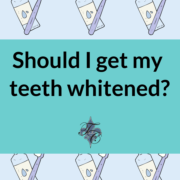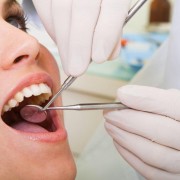What’s the difference in cold sores and canker sores

What is a canker sore?
A canker sore is an open sore inside the mouth or along the tongue. It can also be referred to as an aphthous ulcer. They can cause some discomfort and are normally white or yellow in color along with a red area in the middle. A canker sore is not contagious and therefore cannot be spread with any mouth-to-mouth interaction such as kissing or sharing food and drink.
What is a cold sore?
A cold sore is normally associated with the herpes simplex virus and appears along the lips and side of the mouth. These sores are small but painful and red in color. They can also be called fever blisters. A cold sore can tend to leak fluid and scab at times. Unlike canker sores, a cold sore is highly contagious and can be spread from kissing, sharing food or by touching the sore.
Causes for canker sores
Although there is really no one cause for getting a canker sore, there are some things that doctors and dentist relate canker sores to include the following:
- Stress
- Poor Diet
- Vitamin Deficiency
- Food Allergies
- Menstrual Period
- Hormones
Causes for cold sores
Canker sores can be brought on easily with stress or spicy food, but a cold sore is very different. Cold sores are normally only brought on by the herpes simplex virus from a person who is already infected with the virus. If a person shares their saliva with another person while kissing or sipping on the same glass, this can easily get someone else infected with the virus and therefore bring out a cold sore.
How to detect a cold sore and a canker sore
Knowing which type of sore you have is imperative so that you know what type of treatment you need. Luckily, there are many ways to determine which type of sore you have just by simply looking at your symptoms.
Cold sores offer specific symptoms which include:
- Pain around the mouth or effected area
- Fever
- Sore throat
- Swollen glands
- Clear leaky fluid from sore
- Scab over the blister
Canker sores have their own set of symptoms and can sometimes be confused with cold sores because they can be very similar. Some symptoms of canker sores can be:
- A small painful sore or an open ulcer
- White or yellow in color
- Fever
- Swollen glands
The biggest difference between a canker sore and a cold sore is where they are on the body and what they look like. While a cold sore is usually red and sometimes leaks a clear fluid, a canker sore is usually yellow or white. Both can cause a fever, but normally a canker sore only causes fevers, fatigue or swollen glands in very severe cases.
Treatment for cold and canker sores:
The pain from a canker sore usually lessens within a few days and the sores heal without treatment. If the sores are large, painful and persistent, your dentist may prescribe an antimicrobial mouth rinse or ointment to relieve the irritation. It is also suggested that you avoid foods that irritate your mouth such as citrus fruits, acidic vegetables and spicy flavors. Be sure to brush with a soft-bristled toothbrush and floss daily, which will keep your mouth free from irritating food particles.
Cold sores also typically heal on their own. However, if they are painful or you are embarrassed by their appearance, over the counter topical ointments and creams can be used. The virus that causes the cold sore, unfortunately, can not be cured.
Thankfully, though they are both annoying and painful mouth sores, neither are life threatening and can happen to anyone. If you think you have one of these mouth sores and need advice on treatment, call our office today to schedule a quick appointment so your dentist can help treat your mouth sore.



